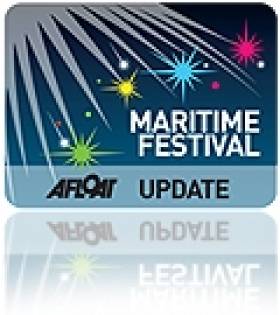Displaying items by tag: Gathering of the Fleet
Stormy Stan Sails In For Arklow's Gathering of the Fleet
#MaritimeFestivals - Stormy Stan sailed into Arklow aboard tall ship Ruth recently as part of the build up to Arklow RNLI’s Gathering of the Fleet Maritime Festival.
This August Bank Holiday weekend, Arklow RNLI and Arklow Harbour will play host to vessels of all shapes and sizes from tall ships such as Ruth to Naval Service vessels, vintage and prototype RNLI lifeboats, emergency service vessels and visiting boats from all around the UK, Ireland and further afield for the fundraising festival, which is now over 50 years old and continues to go from strength to strength.
Boat trips, kayaking and windsurfing opportunities will be up for grabs, as well as the special attraction of the Thundercat Experience, where visitors can head out on the water aboard a Thundercat racing boat.
There will be aerial attractions too, with a flying visit by the Garda Air Support Unit and the regular Air Sea Rescue Display with the Irish Coast Guard's Rescue 117 helicopter.
And that's not to mention the activities or landlubbers such as the carnival, food and craft stalls, live music, model boats, emergency service demonstrations and vintage vehicles.
Arklow RNLI volunteer lifeboat press officer Mark Corcoran said: "This weekend really is a must for maritime enthusiasts and all the family. Almost all of the events are free. This is our opportunity to put something back in our town.
"Without our communities continued support we couldn’t continue, so make sure to come down to Arklow this August Bank Holiday weekend for the Gathering of the Fleet-Arklow Maritime Festival."
He added: "There really is something for everybody, so put it in the calendar."
Full details of the festival will be available on the festival's Facebook page, where anyone with a vessel who wants to take part in the festival can make contact. There is also an opportunity for any novice or experienced sailors to arrive at the festival aboard a tall ship – e-mail [email protected] for further details.





























































